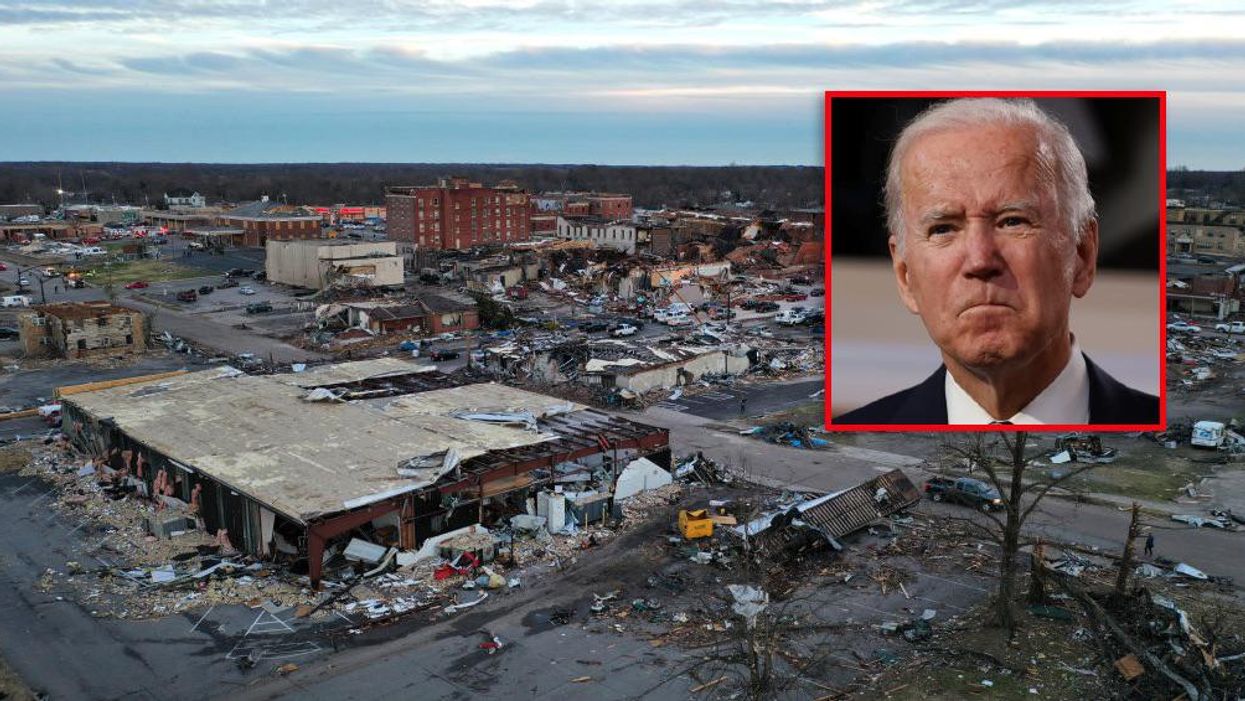
Scott Olson/Getty Images (background), Chip Somodevilla/Getty Images (right)

Meteorologist Joe Bastardi fired back at President Joe Biden for seemingly blaming the devastating tornado outbreak that struck multiple states last week on climate change.
When a reporter asked Biden on Saturday whether climate change contributed to the deadly tornados, Biden pointed to climate change allegedly increasing the intensity of storms.
"All I know is that the intensity of the weather across the board has some impacts as a consequence of the warming of the planet and climate change," Biden said. "The specific impact on these specific storms, I can't say at this point."
"I'm going to be asking the EPA and others to take a look at that," Biden continued. "But the fact is that we all know everything is more intense when the climate is warming. Everything. And obviously, it has some impact here, but I can't give you a quantitative read on that."
Federal Emergency Management Agency Administrator Deanne Criswell was more direct. During an interview on CNN's "State of the Union," Criswell said the extreme weather "is going to be our new normal."
"The effects we are seeing of climate change are the crisis of our generation," Criswell said.
The famed meteorologist accused Biden of weaponizing tornados and shared data showing that severe weather this year has not been as severe compared to previous years.
"Clueless Joe Biden In action again with his weaponization of Tornados. 1) Violent tornadoes not increasing. 2) this year tornados, hail and wind all together near-record low," Bastardi said. "Mindless media should do their dang job and call him on it, I called Trump out on Dorian jibberish."
The data Bastardi included, coming from the National Oceanic and Atmospheric Administration, directly contradicts claims from Biden and Criswell that severe weather is more intense because of climate change.
Clueless Joe Biden In action again with his weaponization of Tornados. 1) Violent tornadoes not increasing. 2) this year tornados, hail and wind all together near-record low. Mindless media should do their dang job and call him on it, I called Trump out on Dorian jibberishpic.twitter.com/AElVGAVMfF— Joe Bastardi (@Joe Bastardi) 1639345154
Climate change hawks love to exploit isolated weather events to promote a certain narrative about the climate. However, climate, by its very definition, describes observable patterns of weather over long periods of time — not isolated events.
Thus, if climate change were truly driving more intense weather, such a phenomenon would be observable over a substantial period of time. But as Colorado University professor Roger Pielke Jr. pointed out on Sunday, the U.S. government's own data shows that tornados, for example, are becoming less common in the U.S.
"According to data from the U.S. National Weather Service from 2000 to 2020 only four of the strongest category of tornadoes were observed (which are labelled as F/EF5 tornadoes) In comparison, from 1954 to 1974 36 (!) such powerful tornadoes were observed," Pielke explained. "Our research on tornado damage in the United States over many decades shows a decline that is suggestive of an actual decline in tornado incidence."
Pielke also highlighted an important point to consider when politicians and those with an agenda begin blaming climate change for weather disasters.
"If it is so well known that disasters are the result of a complex interplay of social and climate factors, why then is climate typically the main focus of attention after every extreme event?" Pielke wrote.
His point: If a tree falls in a forest, but no one hears or sees it, did it make a sound? In a similar way, weather disasters — like the one that happened last week — are only disasters because they impact a significant number of people. If a severe tornado with 200mph winds touches down in rural Nebraska, but causes no damage, no one blames climate change for such an extreme event.
As geographer Gilbert White, known for his work in helping society mitigate the impact of natural disasters, wrote: "Floods are 'acts of God' but flood losses are largely acts of man."